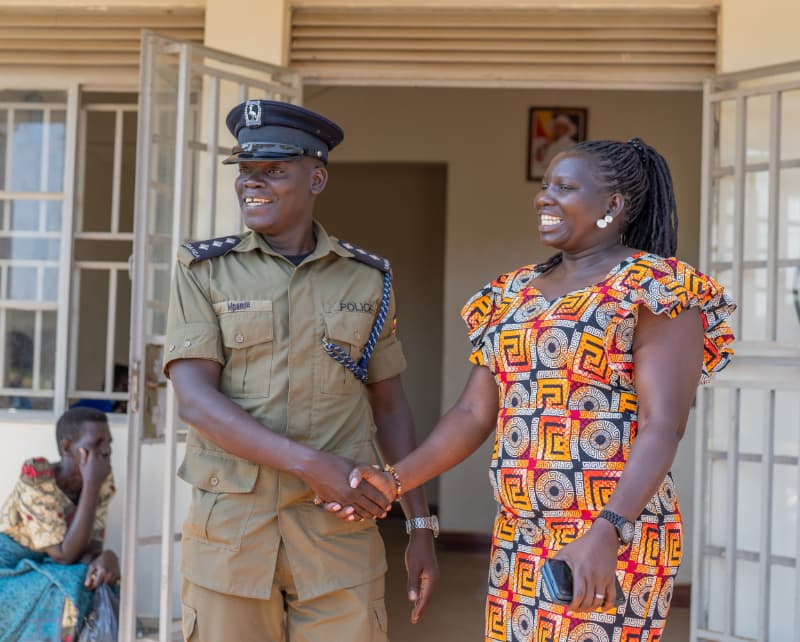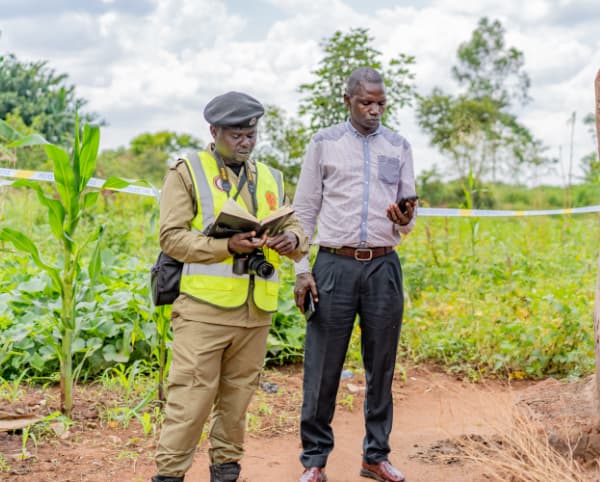Criminals use violence, fraud, and intimidation to steal from widows and orphans.
Redeem leverages the power of law enforcement to protect them.
Why would someone steal land from a widow?
In Africa, land is life – and a highly coveted asset. Land grabbers target widows and orphans, confident that the laws protecting them will never be enforced.
Every acre stolen confirms that land grabbing is highly profitable. Every victimization ignored confirms that it is easy and safe.
With high rewards and little risk, land grabbers show widows and orphans no mercy:
Fraud and
Forgery
Threats and
Intimidation
Arson and
Vandalism
Assault and
Murder
Separated from the key to their survival, land grabbing victims are left destitute:
Homelessness and
Instability
Lost Income
and Poverty
Malnutrition
and Disease
Abuse and
Exploitation

Our Intervention
To protect widows and orphans from the devastation of land grabbing, Redeem deploys local justice professionals to intervene on their behalf.
We partner with local law enforcement authorities to restore victims to their homes, prosecute land thieves for their crimes, and broadcast the results as a warning to those who would consider stealing land from a widow or an orphan.
Our Theory of Change
We support law enforcement in individual cases because:
Law Enforcement Leads to Deterrence
Deterrence Leads to Safety
Safety Leads to Prosperity
People only steal land if the perceived reward outweighs the perceived risk. When would-be land grabbing perpetrators see victims restored to their land and land grabbers prosecuted for their crimes, the reward disappears. Risk is all that remains.
This shift in the risk -reward balance dramatically changes behavior, preventing future land grabbing abuses and providing entire populations with the safety they need to prosper.
Uganda
Since launching in October 2020, we have deployed ten Intervention Teams to strategic locations across Uganda.
Gulu
Deployment Date
October 2020
Projected Impact
23,000 Abuses Prevented
156,000 People Protected
Mbale
Deployment Date
October 2022
Projected Impact
57,000 Abuses Prevented
380,000 People Protected
Iganga
Deployment Date
April 2022
Projected Impact
42,000 Abuses Prevented
282,000 People Protected
Wakiso
Deployment Date
October 2021
Projected Impact
48,000 Abuses Prevented
317,000 People Protected
Lira
Deployment Date
October 2023
Projected Impact
40,000 Abuses Prevented
300,000 People Protected
Soroti
Deployment Date
April 2024
Projected Impact
41,000 Abuses Prevented
271,000 People Protected
Arua
Deployment Date
April 2024
Projected Impact
32,000 Abuses Prevented
215,000 People Protected
Hoima
Deployment Date
October 2024
Projected Impact
37,000 Abuses Prevented
246,000 People Protected
Mubende
Deployment Date
June 2025
Projected Impact
43,000 Abuses Prevented
288,000 People Protected
Tororo
Deployment Date
June 2025
Projected Impact
39,000 Abuses Prevented
261,000 People Protected
Each Intervention Team is made up of 12 local justice professionals
1 Team Lead
2 Investigators
2 Attorneys
2 Social Workers
1 Community Liaison
1 Field Specialist
1 Admin Specialist
1 Casework Administrator
1 Paralegal/Data Officer

Deployed for six years each, Intervention Teams partner with local law enforcement authorities:
Restoring Over
Prosecuting
These law enforcement interventions, shift the risk-reward balance for would-be perpetrators
Preventing the Abuse of Over
Protecting a Population of Over
Preventing the Loss of Over
Zambia Pilot Program
In October 2025, we deployed a Pilot Team to test whether our intervention model can be successfully replicated in Zambia. Over the course of the twelve month pilot project, this team will partner with local law enforcement authorities in roughly ten “test balloon” land grabbing cases.
The purpose of these pilot interventions is to determine whether Zambia’s legal system has both the willingness and capacity to restore land grabbing victims to their homes and prosecute land grabbing perpetrators for their crimes.
Once these propositions have been confirmed, Redeem will begin deploying Intervention Teams to strategic locations across the country, replicating the impact we are already seeing in Uganda.